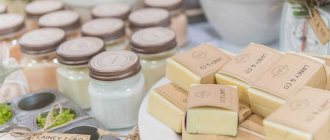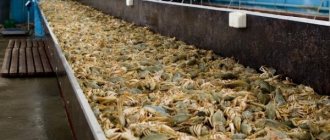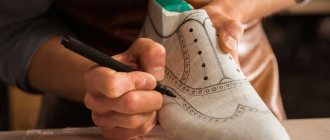Bright and fragrant handmade soap attracts buyers with its unusualness. From an ordinary skin care product, it has turned into a decorative element. With the popularization of bath bombs, such products have sparked a surge in consumer interest. Soap making is a creative hobby that can develop into a successful and profitable project. We’ll talk about how to develop your soap production business from scratch in this article.
Basic properties
Soap is a shelf-stable product. If it suddenly turns out that you chose the wrong shape or other characteristics, the batch of product is outdated, it can be melted down using a new design.
Handmade soap is valued for its environmental friendliness. It can even be medicinal if herbal decoctions are used in its preparation.
To produce it at home you need:
- Soap base, which contains glycerin and fatty acids. It is dense for making solid soap.
- The base oil softens the skin when using soap. The main ones are olive, jojoba, coconut.
- Essential oils (tea tree, ylang-ylang), which add aroma, kill germs.
- Dyes. It's better if they are natural. There are food-grade ones (fading quickly) and synthetic ones. You need to prepare more flowers to make the soap varied and attractive.
- Fillers are those substances that give it certain qualities and recognition. They can be soft (fiber of aromatic berries, honey) or hard, scrubs (ground coffee, raspberry seeds, crushed apricot kernels, non-natural abrasives)
- Fragrances with various odors.
The process is underway
It was something. The process itself was like some kind of witchcraft, and we were two fairies who cooked, added herbs and enjoyed our cooking process.
Hot soap, poured into molds, stood for a day until it hardened. Afterwards the bar of soap was divided into ten parts.
We calculated the costs, and it was 230 rubles for the entire mass of hot soap. Each piece of soap when ripe cost 250 rubles. There were ten or fifteen such pieces (depending on weight). The soap was divided by eye, but the weight of a piece of soap was approximately 80-100 grams.
You can calculate that net income is 250 rubles. * 10 pieces (income from 10 pieces) - 230 rub. (cost for 10 pieces) = 2270 rub. (net income).
The soap matured for one month, but the longer it stood, the more expensive it became, just like expensive alcoholic drinks. But it was worth it.
The soap matured within a month. It had a subtle scent, a hint of herbal notes.
Fragrant soap.
The lather of the soap was quite thick, and after washing with our soap, the skin felt slightly moisturized.
We are starting a sale
We were pleased with our witchcraft. Having packaged it beautifully, we decided to put it up for sale on the Internet. Some products were handed over to stores for sale, and some, taken into baskets, went to be sold.
Production technology
- The soap base is crushed and heated in a water bath until a homogeneous liquid mass is obtained. Stir constantly. They don't boil.
- Add base oil. Fragrances and essential oils are introduced.
- Dyes are added. Synthetic products must be introduced carefully so that the resulting products do not stain customers’ belongings. Add additives and abrasives.
- The molds are greased with oil (preferably corn oil), the resulting mass is poured, weighed, and the surface is leveled.
- The soap is dried for several days at temperatures up to 40° in a room with a humidity of up to 65%. Then removed from the molds. Oil lubrication makes this easy. If the block cannot be removed, pour hot water over the bottom for a couple of seconds.
Soap packaging protects it from moisture, damage, and attracts buyers. The packaging should be durable but transparent. The soap is visible from under it.
Packaging is made to order or using auxiliary materials. But labels with the composition, manufacturer, and weight indicated on them must be present. Use cellophane and plastic containers.
How to make soap for sale?
The entire path to creating soap can be expressed in the following main steps:
- 1
. Cut the bases for the product. In general, it is better to do this into small pieces (or grate using a grater). - 2
. Wait until the soap base is completely dissolved (use the “water bath” method). Don't forget to stir the mixture. - 3
. If you decide to create a fragrant soap, add base oil (at least three teaspoons per 100 grams of base). - 4
. Watch the mass, it should become similar to sour cream, so you need to add cream or milk to it. - 5
. After the soap has dissolved, you need to remove it from the heat and add additional substances (ether, dye, fragrances, etc.). - 6
. Pour the mixture into molds, sprinkle with alcohol (to remove air bubbles from the surface). - 7
. Wait until completely hardened.
Required documents
If you produce large batches of soap, you need:
- Certificate of registration of LLC or individual entrepreneur
- Document on registration with NI
- Declaration of conformity in accordance with technical regulation 009/2011 “On the safety of perfumery and cosmetic products.”
- Voluntary certificate of conformity to GOST R (in the case of trade in handmade soap for household use in Russia).
Many manufacturers undergo voluntary certification in specialized centers. They issue a beautiful certificate that gives buyers more confidence.
To obtain a certificate, you need:
- develop, approve, register technical specifications;
- documents confirming the compliance of the premises with sanitary, epidemiological, fire and hygiene standards.
Starting a business
Starting a business includes three standard steps:
- registration (as an individual entrepreneur or LLC);
- searching for premises where soap production is planned;
- carrying out repair work and purchasing equipment;
- obtaining permits from the sanitary and epidemiological authority;
- Beginning of work.
A businessman does not always go through all the designated steps. If he decides to organize a business at home, there will be no need to search for space. Registration is required for any business development scenario. If the soap maker ignores this step, he will have problems with the Federal Tax Service in the future.
It is recommended to prepare in advance for starting a business. Preparation involves the following actions:
- studying the handmade soap market - looking at companies, their websites, assortment, etc.;
- development of options for selling goods;
- identifying channels to attract the target audience;
- studying thematic forums and trading platforms;
- visiting handmade fairs.
Reference. Monitoring competitors is an important step in developing business literacy. It is necessary to monitor the advertising methods that brands use and other methods of promotion.
Staff
You can create your first pieces of soap with your own hands. But to expand production you will need 5 assistants:
- The cook manages the manufacturing process and is responsible for its result.
- The assistant performs auxiliary operations.
- Three packers.
- The designer develops the form and logo. He may not be a permanent employee, but perform work under a contract. If you are a creative person, you can handle it yourself.
- Sales managers will be needed to sell products.
“If only I could do this!”
Before you get started, it is important to understand how soap making will work. You need to start where the target audience allows: numerous clients (mostly women) with an income that allows them to use expensive handmade soap every day. The labor-intensive but mandatory “practical part” includes the following actions:
- Registration of an individual entrepreneur or LLC - without registering a business activity, sales of a product will not be legal, and declaring products is completely impossible.
- Rent of premises for a soap factory: non-residential, with an area of 10 sq. m. m, preferably finished with moisture-resistant materials, with the possibility of ventilation, with space for storing finished products (“store in a dark and cool place”), which has received permits from the SES and fire supervision. It will be cheaper to rent premises for a soap workshop outside the city.
- Renting premises for a store: a location in a shopping center in a large city is ideal - a walk-through location, with products in plain sight.
- Purchase of simple equipment for a soap factory and store, including a stove, cooking vessels and molds for soap, cutting devices, storage racks, display cases for displaying goods, and decor.
- Drawing up a declaration of conformity for each type of soap. With this document you confirm the high quality and safety of the product.
- Of course, it is important to find a reliable supplier of raw materials - soap base (if you use it), vegetable oils, animal fats, flavors and dyes. When purchasing, check the product certificates. Customers will be attracted by the environmentally friendly composition of the soap, prepared, as the masters say, “from scratch”, without synthetic ingredients. Do not forget that natural ingredients - herbal extracts, fruit, vegetable, algae, berries - must be of high quality.
- If you are starting a large-scale business, then you may need assistants on the soap-making front - the workshop will have to hire one or two craftsmen in order to produce enough products. Having the appropriate skills and health records is mandatory.
The actual sale of the soap produced will not immediately yield a large profit. You can increase the profitability of your enterprise and increase customer flow in the following ways:
- Sell not only soap, but also the ingredients and molds for making it, buying them at a wholesale price and selling them at a premium.
- Along with soap, sell other handmade cosmetics - masks, infusions, decoctions (but they will also need declarations of conformity).
- Conducting master classes on soap making or even organizing courses is a modern and interesting way to attract customers.
Advertising will play an important role in popularizing the enterprise. Act through social networks, distribute leaflets and coupons with discounts near your point of sale, make the most of word of mouth, create your own website, starting with free sites. Remember that selling handmade soap is not just selling, but also disseminating information about the beneficial properties of the ingredients used in making the product. That is why the Internet is an important part of promoting the soap business, allowing you to simultaneously demonstrate the product and talk in detail about it. With the right approach to advertising and business organization in general, soap making will become a source of legitimate income.
In addition, the capabilities of an online store and the lack of serious competition in this field can help promote products outside your region, as well as abroad.
The best way to advertise your mini business selling handmade soap is through the Internet. Place high-quality photos of samples and product information on your pages and blogs. Friends and acquaintances from your city will know about it. You can sell outside of it by creating a group on social networks through an Instagram account.
If production develops, create a website to promote the product. It will be used as an online store, which can bring good income.
Reviews of handmade soap as a business
If you are still in doubt whether it is worth starting such a business, then read what experienced soap makers have to say about it. The average profitability of this business is at 50%, and the average payback period is within 4-5 months. And many people, after successfully making soap at home, are seriously thinking about opening their own store of soap and related products. This means that the business is quite successful and profitable, of course, if you were able to “get a taste” and produce a truly high-quality product.
Good luck in your soap business!
Financial part
- Documents – 4 thousand rubles.
- Arrangement of the premises - 50 thousand.
- Stove - 5 thousand rubles.
- Cooking utensils – 3 thousand rubles.
- Forms (200 pcs.) – 50 thousand rubles.
Total – 112 thousand rubles.
Monthly expenses:
- Rent of premises – 80 thousand rubles.
- Soap base – 150 thousand rubles.
- Dyes, flavors – 15 thousand rubles.
- Supplements, vitamins – 10 thousand rubles.
- Packaging materials – 40 rub.
- Salary, electricity, gas – 80 thousand rubles.
Total 375 thousand rubles.
Total: 487 thousand rubles.
The price of a bar of soap is on average 90 rubles.
The price of 6 thousand pieces is 540 thousand rubles. (if you sell 200 pieces per day).
Required starting capital: from 487 thousand rubles.
Monthly profit: 165 thousand rubles
The information provided in this article is only a brief introduction to the essence of the business. If you decide to move on to implementation, then you need to download a professional soap making business plan with detailed calculations:
Costs and income
Calculation of income and expenses is made before starting a business. It is impossible to predict the exact numerical values of these categories. But an approximate forecast will allow the entrepreneur to avoid unexpected expenses and losses. All financial values are entered into a business plan for the production of handmade soap, which outlines the path of development of the business.
The costs of starting a business fall into two categories: initial and recurring. Initial costs exceed regular ones. Therefore, beginning entrepreneurs choose to purchase equipment on an interest-free loan or in installments. This method reduces the financial burden, but adds additional pressure.
Table 3. Costs when starting a soap making business
| Expense item | Price |
| Registration of individual entrepreneurs and obtaining permits | 35 000 |
| Rent of premises for a two-month period | 40 000 |
| Square renovation | 10 000 |
| Purchase of equipment and materials for cooking | 54 500 |
| Marketing events | 50 000 |
| Total | 189 500 |
Table 4. Monthly expenses for a soap making business
| Expense item | Price |
| Rental fee | 20 000 |
| Public utilities | 30 000 |
| Salary to employees | 100 000 |
| Advertising campaigns | 40 000 |
| Total | 190 000 |
Monthly business expenses vary from person to person. They directly depend on the staff, the rental amount and advertising methods. If an entrepreneur works alone in his own apartment, expenses will be minimal.
Calculating income is impossible without presenting the product range. The more items a store offers, the higher the likelihood of attracting a wide audience. The standard positions of soap stores are presented in the table.
Table 5. Income received from the soap making business
| Soap type | Cost price | Monthly sales | Revenue (RUB) |
| Baby natural | 50 | 200 | 10 000 |
| Children's decorative | 60 | 200 | 12 000 |
| Adult natural | 60 | 150 | 9 000 |
| Adult decorative | 70 | 250 | 17 500 |
| Cosmetic with exfoliating particles | 70 | 140 | 9 800 |
| Cosmetic for face | 100 | 200 | 20 000 |
| Bomb | 70 | 200 | 14 000 |
| Total | 92 300 |
The entrepreneur receives this income for a month of uninterrupted operation of the store. In real conditions, talking about stable profit margins is meaningless. Demand for goods will fluctuate for various reasons. To maintain audience interest, it is important to analyze the products being sold and add new ones to them. For this purpose, cosmetic stores introduce winter and summer collections, etc.
The average profitability for the niche in question is 35-40%. These figures are considered low. Businessmen need to take into account that this area involves high risks. Its unpredictability is compensated by increasing brand awareness and customer base.
Sales channels
So, you have already become a real soap-making professional, you have already given away a bunch of your “masterpieces” to friends and relatives. Now is the time to move up to a higher level and start making money by selling soap to other people. Here are some effective sales channels.
Social media
By opening a specialized group or public page advertising your product, you can get a lot of buyers. Alternatively, if you don’t want to bother creating your own community, advertise in other groups where you think potential consumers live.
Forums and websites
Here you need to act on the same principle as in the case of social networks. Find a place with a large concentration of the target audience, place a description of your product and wait for customers (In principle, you don’t have to sit and do nothing - it’s better to register a couple of fake accounts and write a few good reviews about your product from them. Then buyers will come to you more trust).
Organization of master classes
This sales scheme can rightfully be called classic. An experienced soap maker organizes master classes for those wishing to learn this art, during which he sells his own products or raw materials for making his own soap to his students. Of course, at slightly inflated prices.
The shops
Almost every more or less large city has flower shops, gift shops, beauty salons and similar businesses that can take your goods for sale. As long as the products are sold in small quantities, you won’t even need to worry about their certification.
Own point of sale
Whatever it is - a department in a shopping center, your own store or salon, an online store or something else, the expected sales volumes already imply registration of you as an individual entrepreneur and certification of your products. So, if you want to go this far, there is a lot to learn besides making soap.
It is clear that these are not all sales channels for soap products, but they are tested and proven. Who knows, perhaps you will find a much more suitable option and thereby make a considerable profit.
Advantages and disadvantages
This aspect deserves special attention. Before you start developing a business plan and launching soap making at home, you need to evaluate all the pros and cons that this type of business has. Among the main advantages are the following:
- low level of competition;
- simplicity and clarity of business;
- no need for large start-up capital;
- high demand for products regardless of seasonality and economic situation in the country;
- good prospects for scaling;
- long shelf life of soap.
As you can see, there are enough advantages. As for the downsides, although soap making at home doesn’t have many of them, they do exist. The main ones are:
- the difficulty of legalizing a business;
- If certain standards are not observed and low-quality ingredients are used, products may be harmful to health.
Thus, this type of business has many more pros than cons, which makes it very attractive for novice entrepreneurs who do not have much experience and large start-up capital.
Do you need a special room?
No, you don’t need a separate room for making soap. In limited quantities, it can be prepared directly in the kitchen. One stove is enough to make soap for a single sale. For soap making on an industrial scale, of course, you will need a separate workshop.
Funny incidents from the history of world brands: why Ikea is called that
Competition is high in the fashion capital of London, but young designers have persevered
Business, career, money: horoscope for all zodiac signs for the week 09/28–04/10
It is best if its area is at least 50 m2. Remember that space is needed not only for making soap, but also for storing it. The room must be equipped with a ventilation system and also comply with fire safety standards.











